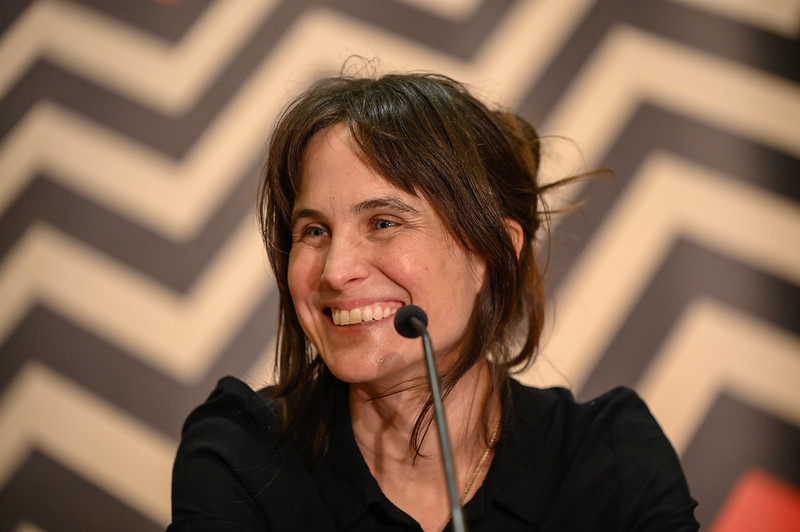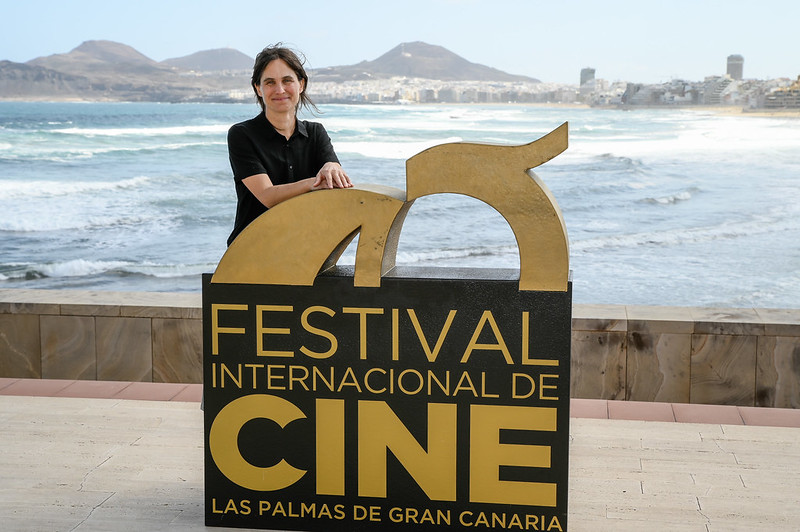• The Argentinian filmmaker is competing in the Official Section of the Las Palmas de Gran Canaria International Film Festival with a feature film that invites viewers to observe a community trapped between fear, secrets and the weight of their decisions

Las Palmas de Gran Canaria, Friday, May 2, 2025.- What was meant to be an idyllic retreat became and oppressive and disturbing experience. Silvina Schnicer’s thriller La quinta (The Cottage) (Argentina, España, Chile, Brasil, 2024, 99 min.) has premiered in Europe as part of the Las Palmas de Gran Canaria International Film Festival.
In a quiet environment hiding deep tensions, La quinta invites viewers to observe a community trapped between fear, secrets and the weight of their decisions. Silvina Schnicer, director of this rural drama in which a family’s tranquility slowly deteriorates, told the media at the Alfredo Kraus Auditorium that “it all began with some memories I have of spending the holidays with my family in a summer house on the outskirts of Buenos Aires.”
They are personal memories and real characters based on her family. Each character, she said, “was born from me,” in the case of the child, her siblings and parents, because her motivation as a writer, she pointed out, “is creating from very personal and intimate memories.” But it is true that, as time went by while she continued to write—a process she loves—, “they transformed and detached themselves from me, becoming independent.” These characters are Rudi (Sebastián Arzeno), Silvia (Cecilia Rainero) and their three children, who are trying to escape their urban daily routine by taking refuge in their country cottage. This cottage “is only a place of shelter or redemption within a green context that helps to reveal issues in the characters that otherwise wouldn’t have come to the surface,” the filmmaker said before admitting she does not like “leaving the place where the story is happening.”
The children, she explained, “are the key to everything, the real protagonists.” During the shooting, “we had to work closely with them” because they each had their own particular roles to fulfill. “They came from different backgrounds and we had to work with them in different ways.”
This third feature film by the Argentinian filmmaker, now competing at the 24th Las Palmas de Gran Canaria International Film Festival’s Official Section after receiving the 2024 Special Jury Award in Marrakech and being selected at the Mar del Plata International Film Festival, addresses the fear felt towards the other, portrayed in certain imaginaries by the most underprivileged social classes, with the help of suspense and the mysterious, of that which does not respond to logic.
La quinta’s plot follows a family who retires to their country cottage to spend their winter holidays. It is a story in which the characters’ different points of views, as well as what they hide, are quite important. Schnicer chose to work with suspense “to catapult the story towards a sort of fiction flirting with the genre,” but always from a gaze persistently full of enigmas.
Ten years went by from the moment she wrote the first draft of the script to the actual shooting. “It was a very, very long process,” though when they began to film “I ended up finding the story I wanted to tell,” she noted.
The Spanish, Chilean and Brazilian co-production was key to get the feature film off the ground. The current situation in Argentina, the director said, “is very difficult,” so the co-producing countries directly helped her to make the film “because otherwise I couldn’t have made it.” This collaboration, she pointed out, “is amazing.” “It’s an eye-opening experience, it boosts projects much further and makes you gain other points of view.” “I’m a strong advocate of these interactions, not only economically but also culturally and professionally,” she stressed before the media.
As it happens, she is trying to start the production of a film in Spain. She acknowledged it is very important for her to present her work at the LPAIFF because “it is a small step on the right direction” to begin her professional career in the country. Argentina, she regretted, “is getting worse,” in addition to the mistreatment of the Film Institute and culture in general. “We have to go out and defend it as much as we can if we want to protect the identity we were able to build after a lot of time and effort.” “I trust in the Argentinian society,” she continued, “we are going to succeed and we are going to move forward in spite of everything.”
Partners, sponsors and collaborators of the 24 FICLPGC
The Las Palmas de Gran Canaria International Film Festival, organized by the Culture area of the Gran-Canarian capital’s City Council through Promoción de la Ciudad de Las Palmas de Gran Canaria, has received public assistance by the ICAA [Institute of Cinematography and Audiovisual Arts], the Visitors’ Program for the Internationalization of Spanish Culture (PICE), of the Spanish Public Agency for Cultural Action (AC/E), as well as public support from Promotur Turismo Islas Canarias.
Among the Festival’s collaborators we may find Fundación Auditorio Teatro, Cines Yelmo, Las Arenas Shopping Center and Hotel Cristina by Tigotan, places which also function as venues or hold activities of the film event; as well as other institutions and companies such as Sagulpa, Toyota, Royal Bliss, Fuze Tea, Coca Cola, Sholeo Lodge, Audiovisuales Canarias, Music Library &SFX, Blackout Films and International Bach Festival. Likewise, its market, MECAS, has been possible thanks to the sponsorship of the Gran Canaria Film Commission-Sociedad de Promoción Económica de Gran Canaria and the support of Proexca.
The University of Las Palmas de Gran Canaria, the Mid Atlantic University, Digital 104, the Audiovisual Cluster of the Canary Islands, the Association of Women Filmmakers and Audiovisual Media CIMA, the Cartagena International Film Festival, the Gijón International Film Festival, the Barcelona Independent Film Festival, the Tres Puertos Laboratory, Barcelona’s ESCAC, and Very Good Script, Freak World and Fimucité are also collaborators.
Share this Post

